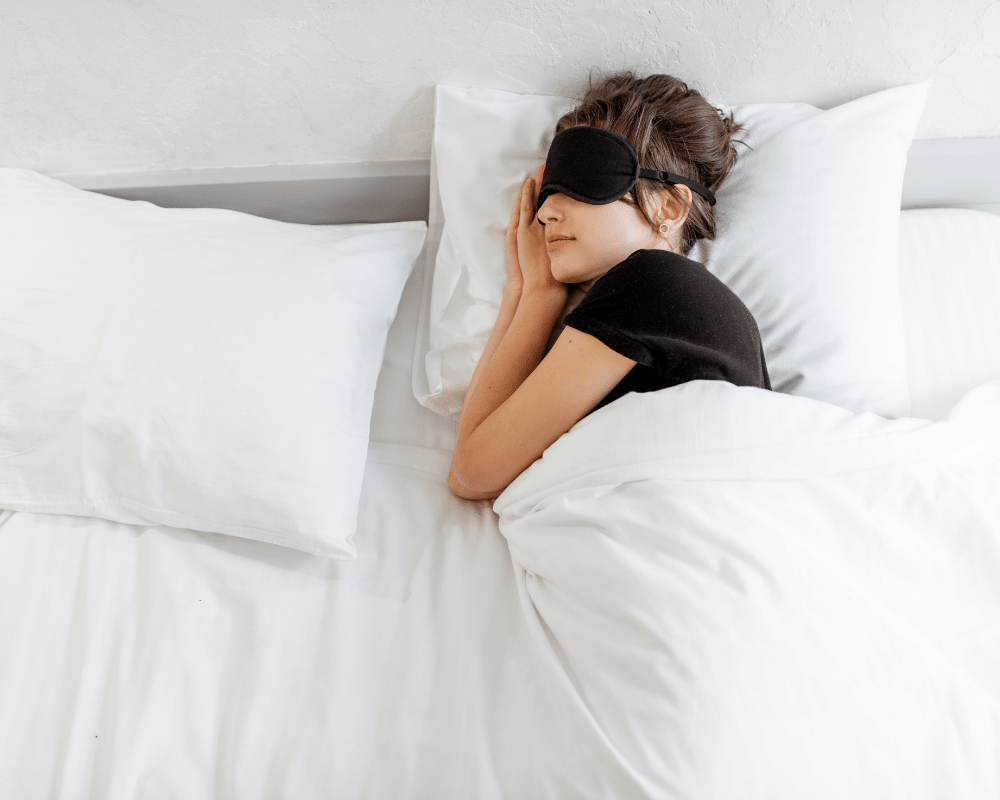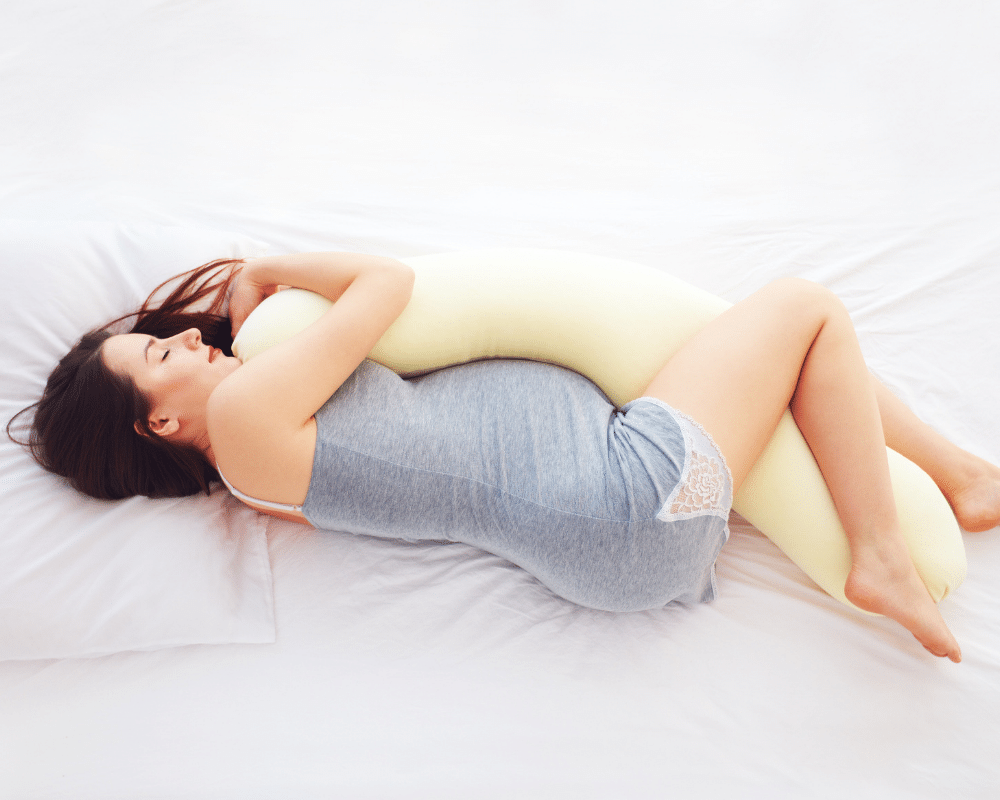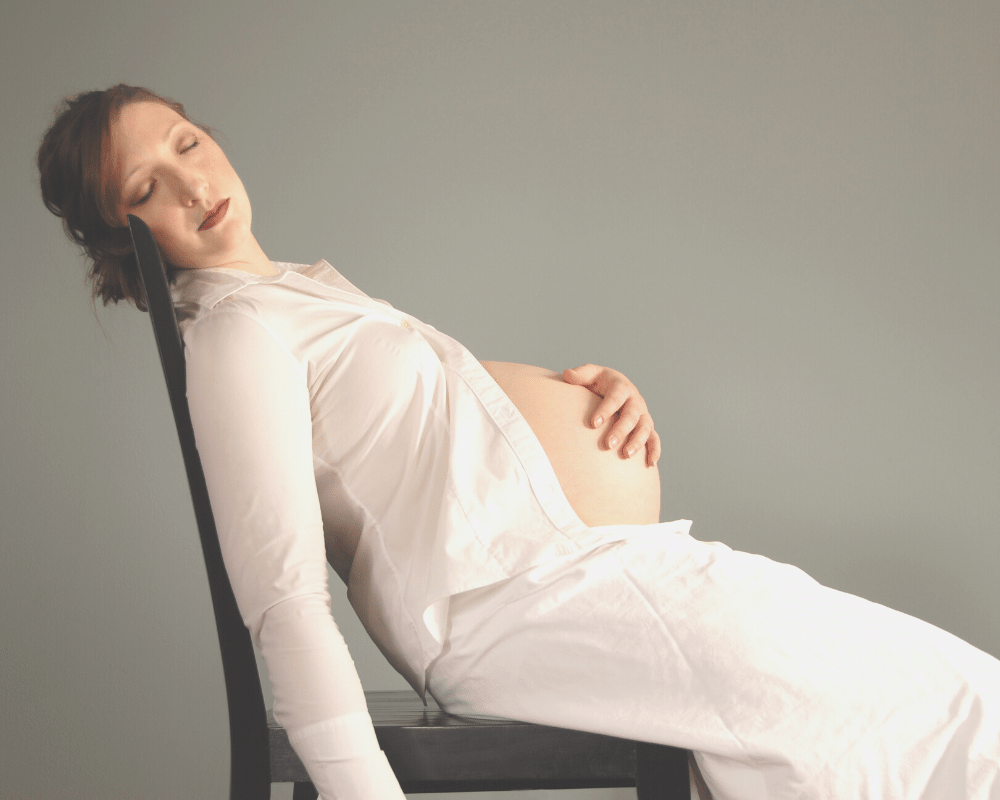It can be challenging to find a comfortable sleeping position during pregnancy. Should you sleep on your stomach, back or side? We round up several tips to make sleeping easier when you are pregnant.
Pregnancy can be tiring. To complicate things further, almost 80% of pregnant women have trouble sleeping, and 15% of women complaining of restless leg syndrome in the third trimester. Hormonal changes, cravings, nausea, and other pregnancy symptoms can also make it harder to sleep comfortably at night, especially in the third trimester when your bump is the heaviest.
Although most women complain of fatigue, they also worry whether certain sleeping positions might affect the health of their unborn baby. In this article, we look at some of the best sleeping positions to try, tweaks that you can make to your bedtime habits to get better sleep, and sleeping aids that are safe to use for expecting mothers.
Sleep On Your Left Side

Pregnant women can actually sleep in any position they choose to during the first trimester. However, sleeping on your stomach and back isn’t the best choice in the long run. If you’re used to sleeping on your stomach, that’s fine – until your growing baby bump makes it impossible to continue sleeping that way. As for sleeping on your back, experts generally do not recommend this sleeping position because this rests the whole weight of your growing body on the back, intestines, and the vena cava, which is the main vein that transports blood from your lower body back to your heart. Sleeping on your back restricts the body’s circulation, and may affect the flow of oxygen and nutrients to your baby. Especially in the second and third trimester, sleeping on your back can lead to backaches, low blood pressure, and even hemorrhoids.
So what is the best sleeping position? Sleeping on your side (on the left, preferably) is the most ideal position for you and your growing baby, as this position allows maximum blood flow to the uterus and puts less pressure on the surrounding organs. This means the kidney is able to process waste fluids more easily, resulting in reduced swelling on the hands and feet. Sleeping on your side has also been proven to help with backaches.
Use Support Pillows

If you have back pain, try sleeping with your knees bent with one or two support pillows tucked in between your knees. Bent knees helps stabilize you while you are sleeping, making you less likely to roll over onto your back. The pillows provide extra cushion that helps keep your back straight and reduce pressure on your spine and hips. You can use body pillows specifically made for pregnancy sleeping, otherwise normal pillows is also fine.
Avoid Eating Trigger Foods
Heartburn is one of the side effects of pregnancy that can keep expecting mothers up at night. Your digestive system is slower than normal due to hormonal changes, and your expanding uterus can compress the stomach and push stomach acids upwards, causing heartburn. Try to have smaller meals near bedtime while staying away from spicy food and heavy late-night meals.
Elevate the Head of Your Bed

If you are still experiencing heartburn, propping your head up on pillows can provide some relief. If that still doesn’t work, try sleeping in a semi-upright position in a recliner instead of the bed.
Get Regular Exercise

Regular exercise can improve your quality of sleep tremendously. Just 10 minutes of low-impact, aerobic exercise such as jogging or cycling will do the trick. In the long run, exercise can strengthen your back and prevent the nagging back pain that many expecting mothers experience.
Stretch Daily

Cramping is an issue many pregnant mothers face. The exact reason is unknown, but pressure from your growing uterus and redistribution of calcium is thought to be the reason. To avoid being awoken by painful leg cramps in the middle of the night, drink lots of water beforehand as dehydration can increase cramps. Incorporating a daily stretching routine and stretching your calves before bedtime also helps in preventing cramps.
Empty Your Bladder Before Going to Bed

In the first trimester, a pregnant women’s blood volume increases, and this puts pressure on the kidneys as the organ needs to process more fluids. As your baby bump grows, the uterus will start to move down through the pelvis and press down on the kidneys. You may feel the urge to take bathroom breaks all the time, especially in the middle of the night. To avoid this, experts recommend going to the bathroom just right before sleeping.
Safe Sleeping Aids for Pregnancy

Sometimes vitamin deficiencies can be the reason behind pregnancy discomforts. Low levels of iron and folic acid can trigger restless leg syndrome, hence supplementing with folic acid and iron can help relieve the symptoms. If you experience heartburn regularly, taking over-the-counter antacids may help. In any case, you should consult your doctor before taking supplements during pregnancy.
Pregnancy can be stressful. While you may have a lot of things to worry about, your sleeping position shouldn’t be one of them! Sleep guidelines notwithstanding, you should always listen and follow the cues from your body. If you wake up in the middle of the night and find yourself sleeping on your back, fret not – just flip back over to your side and continue sleeping. It is exceedingly rare for people to sleep in one position throughout the night, and there is no evidence that accidentally sleeping on your back will cause lasting harm to the baby. Just try not to sleep on your back for prolonged periods of time.


